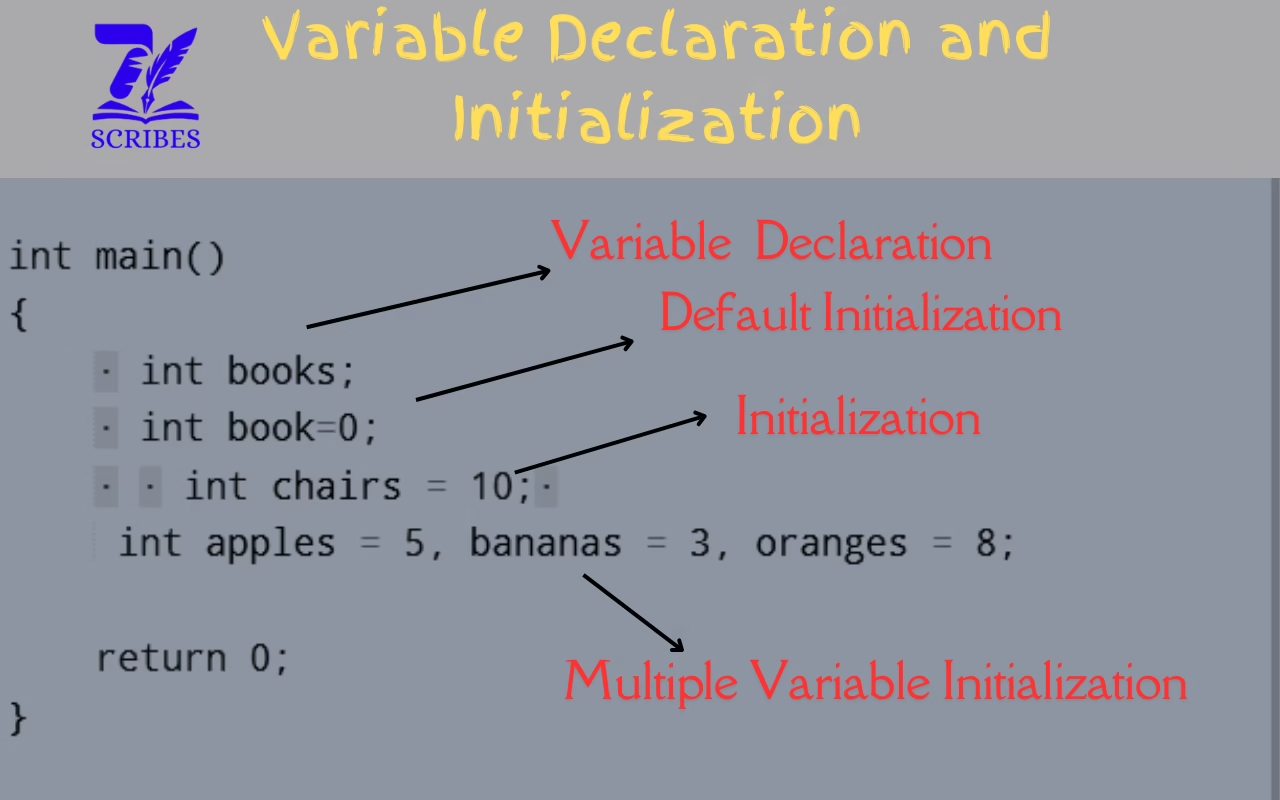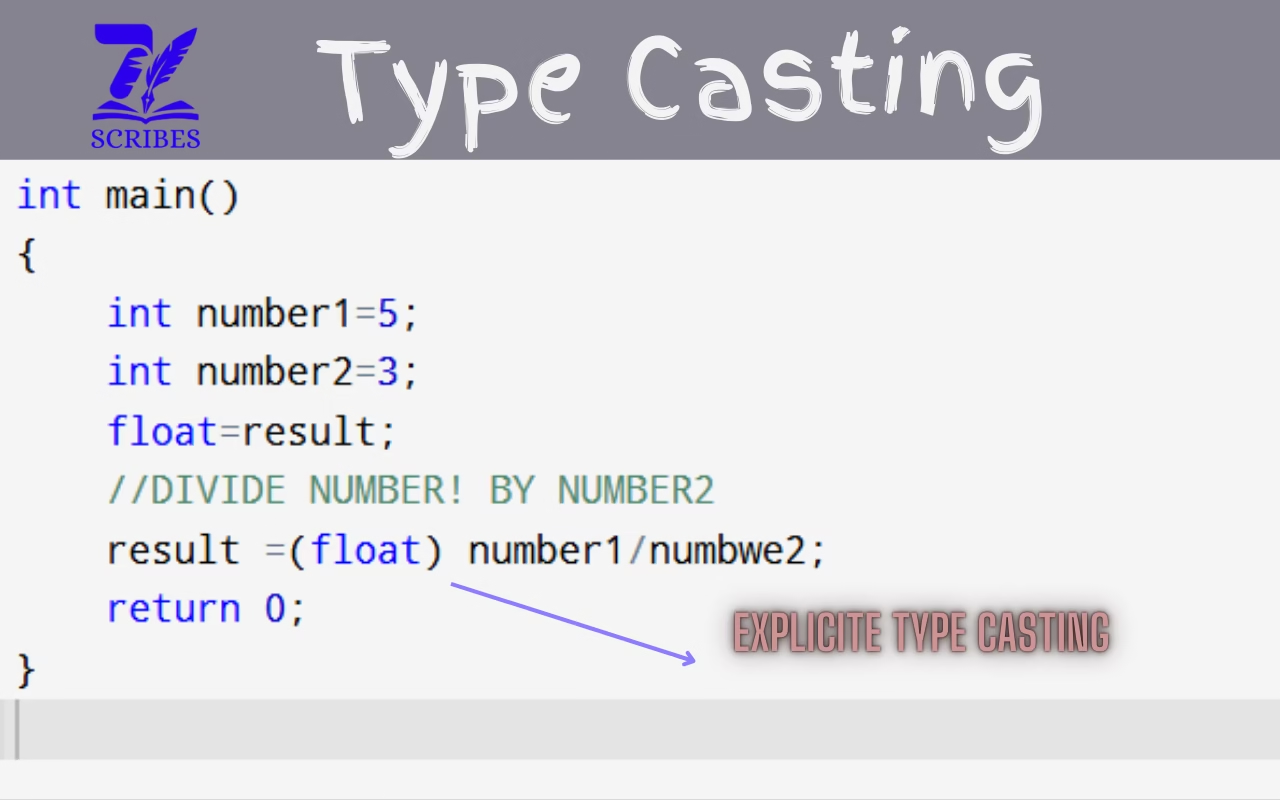In C++, the data type of a variable determines what kind of data it can hold. Understanding variables and data types is fundamental to writing efficient and bug-free code. Just like in daily life, where we have different types of containers for storing various kinds of things (like cups for water, boxes for toys, etc.), in programming, we use different types of variables to store data. This article will explain what data types are, how to declare variables, how constants work, and how type casting and scope affect your code.
What Are Data Types?
In programming, data types can be compared to the containers or boxes you use daily to organize items. The type of container dictates what it can hold and how much space it occupies.
Read more about data type click here
Example: Before you can organize your books, you must decide to prepare a bookshelf.
In practical terms, declaring a variable is similar to recognizing a need for a specific container, like a box for apples or a bottle for milk.
int books;
Initialization:
This is akin to filling a container with its first item right when you acquire it.
Example: You have a box where you decide to place 10 books.
int books = 10;
Uninitialized Variables:
If you don’t initialize a variable, it’s like having an empty container without a specific purpose. This can lead to confusion or unpredictable outcomes.
Example: You might have an empty box (uninitialized) that you plan to fill, but it’s unclear what will go inside.
int books;
Default Initialization:
Sometimes, if you don’t fill a box, it might automatically set to a default value (like 0).
Example: You might set a default temperature of 0°C if no specific value is assigned.
int temperature = 0;
Multiple Declarations:
You can declare multiple items at once, similar to arranging several boxes in a single section, all labeled for their contents.
Example: You might prepare boxes for apples, bananas, and oranges in one go.
int apples = 5, bananas = 3, oranges = 8;
3.constant Variable
What is a Constant?
A constant is a type that maintains a fixed value after its initial assignment. Imagine it as a secured container—you can place something inside, but you can’t remove or alter it later.
Example: const int MAX_VALUE = 100; In this example, `MAX_VALUE` remains constant at 100 throughout the program.
Benefits of Constants
Constants are valuable because they help prevent unintentional modifications to values meant to remain unchanged, such as limits or configuration settings within your application.
4.Type Casting in C++
What is Type Casting?
Type casting refers to the method of converting one data type into another. Occasionally, the information you need to work with may not be in the correct format, and type casting resolves this issue.
Implicit Type Casting (Automatic Conversion)
When operating with different data types, the compiler automatically promotes the smaller type to a larger type.
Example: `double result = 3 / 2;` Here, both 3 and 2 are integers, but the result is stored as a double, meaning C++ automatically adjusts the types.
Explicit Type Casting (Type Conversion)
There are instances when you must instruct C++ precisely on how to convert types.
Example: `double result = (double)3 / 2;` This indicates to C++ that 3 should be treated as a double before performing the division.
5.Scope and Lifetime of Variables
What is Scope?
Variable scope determines where it is accessible within your code.
Local Scope:
A variable is available only within the specific function or block it was defined in.
Example: `int x = 10;` Here, `x` can only be accessed within its defining function.
Global Scope:
A variable declared outside any function is accessible throughout the program.
Example: `int globalVar = 50;` `globalVar` can be used anywhere in the program.
Lifetime
The lifetime of a variable refers to how long it persists in memory.
Local:
These exist solely for the duration of the function in which they are created and are removed after the function completes.
Global:
These exist for the entire runtime of the program.
Static:
Static variables keep their value even after the function execution is complete.
Example: `static int count = 0;`
Conclusion
By grasping the fundamentals of variables in C++, including data types, constants, and their scope, you build a solid base for developing more sophisticated and efficient programs. Mastering these concepts will enable you to explore advanced topics, enhancing your programming skills. Experiment with different declarations and the use of constants, type casting, and scope as you dive into your next C++ project!
Read more about other article related to programming
1. What are data types in C++?
Data types in C++ define what kind of data a variable can hold, such as integers, floating-point numbers, characters, and booleans. They help in organizing data and optimizing memory usage.
2. What is the difference between declaring and initializing a variable in C++?
Declaring a variable means stating its type and name, while initializing a variable means assigning it an initial value. For example, int books; declares the variable, and int books = 10; initializes it with a value.
3. What is a constant in C++ and why is it useful?
A constant is a variable whose value cannot be changed once it is set. It is useful for ensuring that important values, like configuration settings or limits, remain constant throughout the program.
4. What is type casting in C++?
Type casting in C++ is the process of converting one data type into another. Implicit casting happens automatically (e.g., from int to double), while explicit casting requires the programmer’s instruction (e.g., using (double)3 to convert an integer to double).
5. What is the scope and lifetime of a variable in C++?
The scope of a variable refers to where it can be accessed in the program, such as within a function (local scope) or globally (global scope). The lifetime of a variable refers to how long it exists in memory, with local variables being destroyed after function execution, and global variables lasting for the entire runtime of the program.